Polyethylene Foam Liners
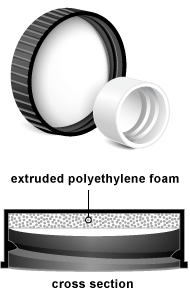
An ideal general-purpose liner material, the compressible PE foam creates a stable seal. Read PE Liner Product Spotlight
Buy PE Lined Caps
Benefits:
- Good resistance to acids, alkalis, solvents, alcohols, oils, household cosmetics, and aqueous products.
Disadvantages:
- Fair to poor resistance to hydrocarbon solvents
PS22 Liners
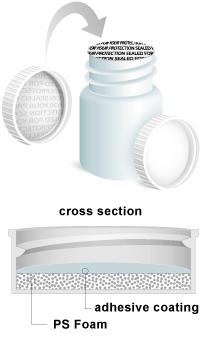
A pressure sensitive foam liner with one adhesive side that sticks to the container with the pressure used to secure the closure onto the container. When the closure is removed, the pressure sensitive liner remains on the top of the container. Read PS Liner Product Spotlight
Buy PS 22 Lined Caps
Benefits:
- Require no machinery for application
- Provides an added layer of protection while storing
Induction Liners
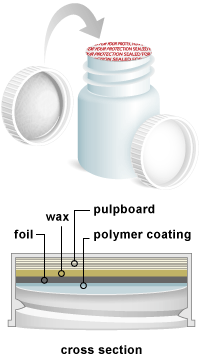 Induction liners have several layers: pulpboard, wax, foil, and a polymer coating. When passed through an induction machine, the heated foil melts the wax and polymer, creating a hermetic seal with the container when solidified. Read Induction Liner Product Spotlight
Induction liners have several layers: pulpboard, wax, foil, and a polymer coating. When passed through an induction machine, the heated foil melts the wax and polymer, creating a hermetic seal with the container when solidified. Read Induction Liner Product SpotlightBuy Induction Caps
Benefits:
-
Tamper Evidence
Once the liner has been removed, it cannot be reapplied to the container. -
Hermetic Seal
Creates an airtight seal to help prevent leakage
Disadvantages:
- Must be applied using an induction sealing machine
Poly Vinyl Liners
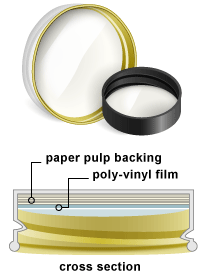
A pulp / poly liner consists of a poly-vinyl film adhered to a white pulp paper backing.
Buy Plastic PV Lined CapsBuy Metal PV Lined Caps
Benefits:
- Chemical resistance to mild acids, alkalis, solvents, alcohols, oils and aqueous products
Disadvantages:
- Not recommended for active hydrocarbons or bleaches
Polyseal™ Liners
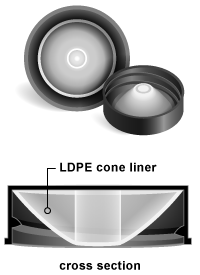 Made from LDPE plastic, these cone liners provide a wedge-type seal across the top of the container as well as the inside diameter. Commonly used for liquid products. Read Polyseal Liner Product Spotlight
Made from LDPE plastic, these cone liners provide a wedge-type seal across the top of the container as well as the inside diameter. Commonly used for liquid products. Read Polyseal Liner Product SpotlightBuy Cone Lined Caps
Benefits:
- Stress crack resistant
- Superior torque retention
- Excellent sealing characteristics
Teflon® PTFE Liners
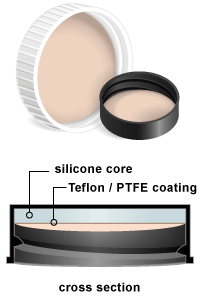
A variety of liners may have Teflon® facing, such as silicone or PE foam. A Teflon® -faced liner will maintain the base liner's sealing properties while adding superior chemical resistance.
Buy Teflon® Caps
Benefits:
- Withstands volatile solvents, sensitive compounds and corrosive chemicals that would degrade other liner materials.
Disadvantages:
- Expensive
Foil Liners
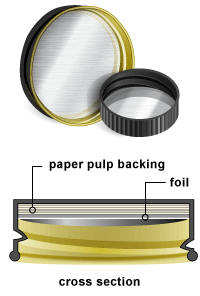 A polyester film laminated to aluminum foil, bonded to pulp board.
A polyester film laminated to aluminum foil, bonded to pulp board. Buy Metal Foil Lined Caps
Benefits:
- Good barrier properties
- Good resistance to hydro carbonates, oils, ketones and alcohols
Disadvantages:
- Not recommended for acids or alkalis.
Plastisol Liners
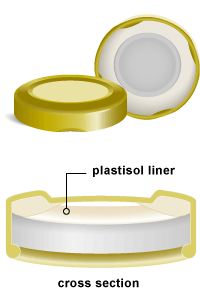 A plastic gasket on the inside of a metal closure that creates an airtight seal with the container when properly heated and cooled. Read Plastisol Liner Product Spotlight
A plastic gasket on the inside of a metal closure that creates an airtight seal with the container when properly heated and cooled. Read Plastisol Liner Product SpotlightBuy Plastisol Lined Caps
Benefits:
- Tamper evidence
- Hermetic seal
Disadvantages:
- Must be used with containers that can withstand high heat.
Additional Information
Chat with Us